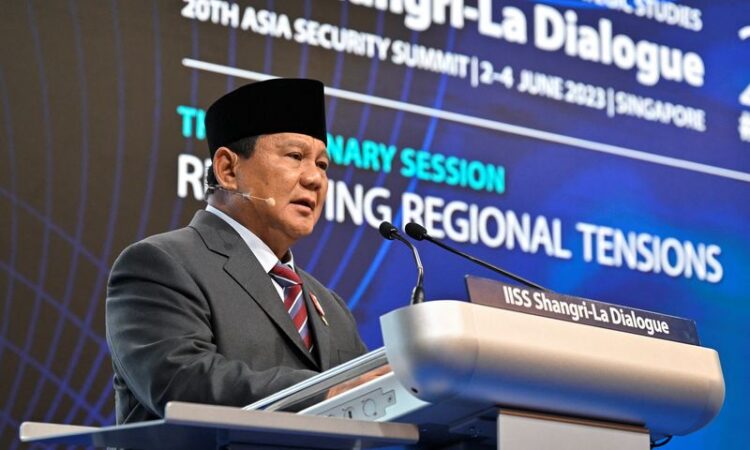
SINGAPORE (Reuters) – Indonesia’s defence minister on Saturday proposed a peace plan for the war in Ukraine, calling for a demilitarised zone and a United Nations referendum in what he called disputed territory.
Prabowo Subianto called on defence and military officials from around the globe gathered at the Shangri-La Dialogue defence meeting in Singapore to issue a declaration calling for a cessation in hostilities.
He proposed a multi-point plan including a ceasefire “in place at present positions of both conflicting parties” and establishing a demilitarised zone by withdrawing 15 kilometres (nearly 10 miles) from each party’s forward position.
The demilitarised zone should be observed and monitored by a peacekeeping force deployed by the United Nations, he said, adding that a UN referendum should be held “to ascertain objectively the wishes of the majority of the inhabitants of the various disputed areas”.
“I propose that the Shangri-La dialogue find a mode of… voluntary declaration urging both Ukraine and Russia to immediately start negotiations for peace,” Prabowo said.
Indonesia’s proposal follows President Joko Widodo’s visit year to Moscow and Kyiv, where he offered to play peace broker between their leaders and rekindle peace talks. He was also chairman of the G20 group of major economies at the time.
Speaking on the same panel, Josep Borrell Fontelles, high representative and vice president of the European Union’s European Commission, noted that if military support for Ukraine stopped, the war would quickly end – but with that country’s sovereignty falling to outside aggression.
“We cannot stop supporting militarily Ukraine because we don’t want the peace which is … the peace of the surrender. The peace of the stronger,” Borrell said.
Ukrainian President Volodymr Zelenskiy has proposed a 10-point peace plan, which calls on Russia to withdraw all its troops from Ukraine. Chief diplomatic adviser Ihor Zhovkva said Ukraine had no interest in a ceasefire that locks in Russian territorial gains.
(Reporting by Kanupriya Kapoor; Editing by Gerry Doyle)
By Kanupriya Kapoor





